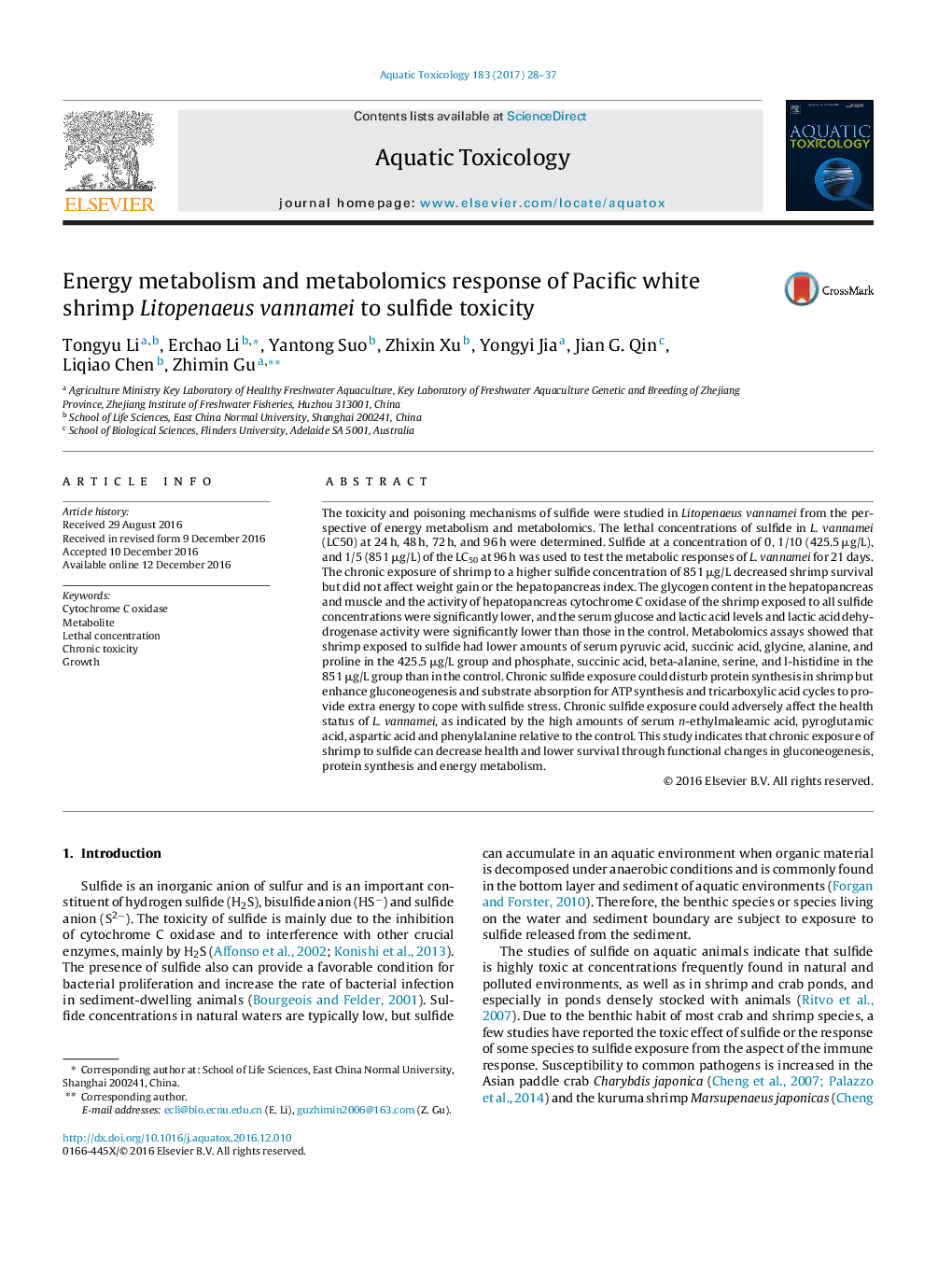| کد مقاله | کد نشریه | سال انتشار | مقاله انگلیسی | نسخه تمام متن |
|---|---|---|---|---|
| 5764198 | 1625922 | 2017 | 10 صفحه PDF | دانلود رایگان |
عنوان انگلیسی مقاله ISI
Energy metabolism and metabolomics response of Pacific white shrimp Litopenaeus vannamei to sulfide toxicity
دانلود مقاله + سفارش ترجمه
دانلود مقاله ISI انگلیسی
رایگان برای ایرانیان
کلمات کلیدی
موضوعات مرتبط
علوم زیستی و بیوفناوری
علوم کشاورزی و بیولوژیک
علوم آبزیان
پیش نمایش صفحه اول مقاله

چکیده انگلیسی
The toxicity and poisoning mechanisms of sulfide were studied in Litopenaeus vannamei from the perspective of energy metabolism and metabolomics. The lethal concentrations of sulfide in L. vannamei (LC50) at 24 h, 48 h, 72 h, and 96 h were determined. Sulfide at a concentration of 0, 1/10 (425.5 μg/L), and 1/5 (851 μg/L) of the LC50 at 96 h was used to test the metabolic responses of L. vannamei for 21 days. The chronic exposure of shrimp to a higher sulfide concentration of 851 μg/L decreased shrimp survival but did not affect weight gain or the hepatopancreas index. The glycogen content in the hepatopancreas and muscle and the activity of hepatopancreas cytochrome C oxidase of the shrimp exposed to all sulfide concentrations were significantly lower, and the serum glucose and lactic acid levels and lactic acid dehydrogenase activity were significantly lower than those in the control. Metabolomics assays showed that shrimp exposed to sulfide had lower amounts of serum pyruvic acid, succinic acid, glycine, alanine, and proline in the 425.5 μg/L group and phosphate, succinic acid, beta-alanine, serine, and l-histidine in the 851 μg/L group than in the control. Chronic sulfide exposure could disturb protein synthesis in shrimp but enhance gluconeogenesis and substrate absorption for ATP synthesis and tricarboxylic acid cycles to provide extra energy to cope with sulfide stress. Chronic sulfide exposure could adversely affect the health status of L. vannamei, as indicated by the high amounts of serum n-ethylmaleamic acid, pyroglutamic acid, aspartic acid and phenylalanine relative to the control. This study indicates that chronic exposure of shrimp to sulfide can decrease health and lower survival through functional changes in gluconeogenesis, protein synthesis and energy metabolism.
ناشر
Database: Elsevier - ScienceDirect (ساینس دایرکت)
Journal: Aquatic Toxicology - Volume 183, February 2017, Pages 28-37
Journal: Aquatic Toxicology - Volume 183, February 2017, Pages 28-37
نویسندگان
Tongyu Li, Erchao Li, Yantong Suo, Zhixin Xu, Yongyi Jia, Jian G. Qin, Liqiao Chen, Zhimin Gu,